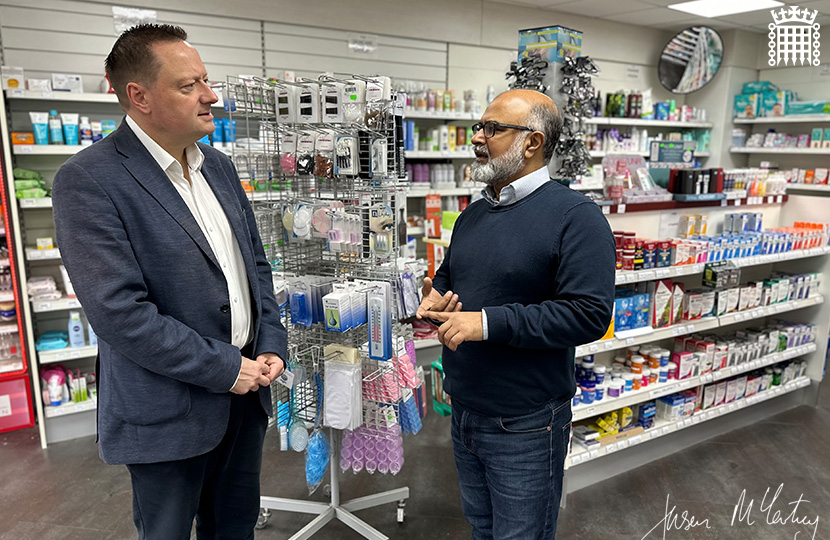
- The pandemic put huge pressure on the NHS, but the Conservative Government has made good progress on its priority to cut waiting lists, virtually eliminating waits of over two years and cutting 18 month waits by over 90 per cent from their peak – but there is more to do.
- That is why Jason McCartney MP has welcomed the Pharmacy First approach, meaning 488 pharmacies across West Yorkshire IC will be able to treat common health conditions without patients needing to see a GP, freeing up to 10 million GP appointments a year as part of the Conservative Government’s Primary Care Recovery Plan.
- By sticking to the plan, the Conservative Government will continue to make progress on improving access to primary care and cutting NHS waiting lists, helping patients to receive the treatment they need more quickly.
Jason McCartney MP has welcomed the launch of the Conservative Government’s Pharmacy First approach, helping patients across Colne Valley, Holme Valley and Lindley to receive care more quickly through better use of our community pharmacies.
488 pharmacies in West Yorkshire IC have signed up to Pharmacy First so far, which enables pharmacists to utilise more of their medical skills and training. This will mean that patients across Colne Valley, Holme Valley and Lindley can receive treatment for seven common health conditions from their local pharmacy without the need to visit a GP or have a prescription.
Their pharmacist will be able to help with conditions include sinusitis, sore throat, earache, infected insect bite, impetigo, shingles, and uncomplicated urinary tract infections in women. Following the assessment, the pharmacist can then supply the prescription-only medicines, including antibiotics and antivirals, to treat the problem.
The new Pharmacy First approach will not only speed up access to essential care for patients, but also help to reduce pressure on local GP services by directing people to more appropriate places to be treated. Backed by up to £645 million, 95 per cent of pharmacies across England have opted-in so far, meaning that patients will be able to receive care more quickly without the need to wait for a GP appointment.
The Pharmacy First approach builds on the other measures outlined in the Primary Care Recovery Plan last spring, including tackling the 8am rush by giving GPs new digital tools and providing more GP staff and more appointments.
In combination, the Primary Care Recovery Plan aims to free up 10 million GP appointments a year by next winter, and give the public more choice in where and how they access care.
The Conservative Government has made strong progress on improving access to primary care including meeting its manifesto pledge to deliver 50 million additional GP appointments since 2019 and recruiting record numbers of doctors and nurses for the NHS.
By sticking to the plan, the Government is delivering on the Prime Minister’s pledge to cut NHS waiting lists, delivering more care in the community and ensuring that patients receive the care they need, when they need it.
Commenting, Jason McCartney MP said:
“The pandemic put huge pressure on our NHS services here in Colne Valley, Holme Valley and Lindley and as we continue with our recovery, it is essential that patients receive the care they need quickly and easily.
“That is why I am delighted that the Conservative Government has launched the Pharmacy First approach, using the skills of our pharmacists to treat more people in the community without the need for a GP appointment – speeding up their own care as well as reducing pressure on local GP services.
“At least 488 of pharmacies have signed up to Pharmacy First across West Yorkshire IC ensuring that the local people can access care.
“We are sticking with the plan to improve access to care and cut NHS waiting lists, delivering on the Prime Minister’s priority so that that everyone can access the treatment they need.”
Health and Social Care Secretary, Victoria Atkins MP said:
“I’m determined to deliver faster, simpler, fairer access to care for patients, and the expansion of Pharmacy First will mean patients can get treatment for common conditions without needing to see their GP first.
“This is good news for patients and good news for the NHS. It will free up millions of GP appointments per year and mean that patients can get quick and effective treatment from their local pharmacy.
“As four in five people live within a 20-minute walk of a pharmacy, for many seeing their local pharmacist will be the easiest option – so this initiative will have real benefits for patients and help cut NHS waiting lists.”
ENDS
Notes to Editors
- The Conservative Government launched the Pharmacy First approach on 31 January 2024, which enables patients to receive treatment for seven common health conditions from their pharmacy without needing to visit a GP. Backed by £645 million, the new service will enable pharmacists to treat conditions including sinusitis, sore throat, earache, infected insect bite, impetigo (a bacterial skin infection common in young children), shingles, and uncomplicated urinary tract infections in women without the need for patients to see a GP or have a prescription. More than 95 per cent of pharmacies in England have opted-in so far with services available from the day of launch (DHSC, Press Release, 31 January 2024, link).
- The Primary Care Recovery Plan was published in May 2023 and includes a package of measures to improve access to primary care. Over £1.2 billion of funding has been made available to the plan, to deliver measures including digitising phone lines to end the 8am rush, launching our Pharmacy First approach, and streamlining the number of targets on primary care networks from 36 down to five, freeing up time and money in GP services and reducing demand. Together, it is estimated that these measures will release up to 10 million appointments a year by 2024-25 (DHSC, Oral Statement to Parliament, 9 May 2023, link).
- The Conservative Government has eliminated longer waits all together through our elective recovery plan, sticking to the plan to speed up access to treatment and cut waiting lists. Waits of over two years have been virtually eliminated and 18 month waits cut by over 90 per cent from the peak in September 2021, proving that the plan is working and delivering on the Prime Minister’s priority of cutting waiting lists (DHSC, Press Release, 31 October 2023, link).
- The Conservative Government has recruited a record number of doctors and nurses for our NHS, delivering on their manifesto pledge to deliver 50,000 more nurses as we cut waiting lists and build a better NHS. Between November 2022-23, we recruited 6,656 more doctors and 20,738 more nurses, meaning there are 45,220 more doctors and 69,685 more nurses since 2010, helping to cut waiting lists and deliver better care for patients (NHS England, Workforce Statistics, 25 January 2024, link).
- The Conservative Government commissioned the first ever NHS Long Term Workforce Plan, setting out a clear plan to grow the workforce and put the NHS on a sustainable footing for the future. As part of the £2.4 billion long-term plan, the number of pharmacy training places and GP training places will both increase by nearly 50 per cent by 2031-32. The pharmacy technician workforce will also be expanded to support the growth and transformation of the pharmacy workforce (NHS England, NHS Long Term Workforce Plan, 30 June 2023, link).
- The Conservative Government has expanded the primary care workforce, meeting their manifesto pledge to recruit 26,000 more primary care professionals one year early by sticking to the plan to speed up access to care and cut waiting lists. 26,000 more primary care professionals, such as dieticians and paramedics, have been recruited into GP practices since March 2019, meeting their pledge one year early (DHSC, Press Release, 18 May 2023, link).
- The Conservative Government is delivering 250,000 more GP appointments each month and achieved their manifesto pledge to deliver 50 million more GP appointments, making it easier to see a doctor and cutting waiting lists. In November 2023, we delivered 31.52 million GP appointments compared to 31.27 million appointments in November 2022 – an increase of 250,000 appointments, helping to cut waiting lists (NHS Digital, Appointments in General Practice, 4 January 2024, link; DHSC, Press Release, 30 November 2023, link).
- The Conservative Government has a strong record of backing community pharmacies. Since 2019, the Conservative Government has overseen an increase of more than 5,800 registered pharmacists in England, and struck a historic five-year deal with the sector in 2019 – committing nearly £2.6 billion per annum to the sector (DHSC, The Community Pharmacy Contractual Framework, 22 July 2019, link; General Pharmaceutical Council, GPhC registers data, December 2023, link).

